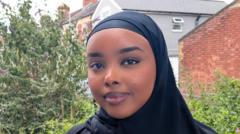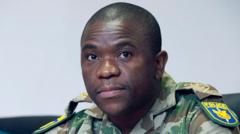Can You Be the Change Your Homeland Needs?

Celebrating the Connection Between Wales and Somaliland
In a conference room overlooking Grangetown in Cardiff, a significant event unfolds, marking a profound connection between two cultures. Chairs are neatly set out, and Welsh flags hang proudly alongside the tricolour flag of Somaliland, a self-declared republic with deep ties to Wales. "Today is a historical day for the Somaliland Welsh community," says Prof Eid Ali Ahmed, emphasizing the importance of this occasion.
As the community comes together, they commemorate the 65-year anniversary of Somaliland's independence from Great Britain. This milestone resonates deeply with the long-standing community that has thrived in Cardiff for more than 150 years. "Today we are showing that journey and connection between Wales and Somaliland," Prof Ahmed adds, highlighting the significance of cultural heritage.
Community Gathering: A Bridge Between Cultures
Filing into the room are community elders, guests from Somaliland's parliament, and, importantly, young Welsh Somalilanders eager to learn about their rich history. Munirah Hashi, a 27-year-old born and raised in Cardiff, expresses the sentiment shared by many: "I think it's important, especially as the youth now, to embrace your culture, embrace your identity on either side." She identifies proudly as a Welsh Somalilander, reinforcing the notion that cultural identity is multi-faceted.
As the event commences, 17-year-old Zaynab Ahmed plays a crucial role by translating speeches made in English and Somali into Welsh. "I would say that I am a Welsh person, I would say I am a Somali person, and I don't think someone should have to compromise one to claim another," she asserts, showcasing the harmony of her dual identity. Zaynab, who attended a Welsh medium primary school, finds joy in the curiosity of those around her, stating, "Welsh speaking was something that I always knew like the back of my hand." Her passion for both cultures shines through.
Empowering the Next Generation
The event continues as Munirah and Zaynab take to the stage to lead a panel about their experiences as Welsh Somalilanders. The impact of their stories resonates throughout the room. "Amazing," remarks Prof Ahmed. "I was really impressed that many of our young generation came." He emphasizes the importance of the questions being asked and the commitment shown by the youth to embrace their heritage while actively participating in the Welsh community.
Prof Ahmed's hope for the future is clear: "They are showing they are Somalilanders, but they are also Welsh, and they were speaking the Welsh language as well. That was really giving me motivation, telling me that legacy will not die, it will continue." This legacy is intertwined with the ongoing campaign for Somaliland's recognition as an independent nation, a significant topic that permeates discussions within the community.
The Historical Context of Somaliland
To understand the essence of this celebration, it is essential to delve into Somaliland's complex history. Under British colonial rule for 72 years, Somaliland gained its independence on June 26, 1960. This momentous occasion brought joy to its citizens, marking a new chapter in their journey. However, just five days later, Somaliland voluntarily united with Somalia, a decision that would have lasting ramifications.
After years of civil war and the eventual overthrow of the military dictator Siad Barre, Somaliland declared its independence from Somalia in 1991. This declaration led to the establishment of a functioning political system, government institutions, a police force, and its own currency. Yet, despite these advancements, Somaliland remains unrecognized by the international community, with Somalia still viewing it as part of its territory.
Personal Stories of Resilience
Fatima Saeed Ibrahim, who was raised in Newport and returned to Somaliland in 1991, embodies the connection between the two regions. "I'm a Welsh lass," she remarks, "but I've lived in Somaliland for a very long time." Reflecting on the early days of conflict, she recalls, "Cardiff was the first place that we found refuge, we found understanding." Fatima highlights the awakening of Welsh youngsters to their roots and the extraordinary history they share.
Ali Abdi, a key figure in the Somaliland Welsh community, oversees the day's proceedings with a sense of pride. "It's so important to be passing that baton down to the younger generation," he emphasizes, expressing a desire to see Somaliland recognized during his lifetime. He notes the evolution of the community, stating, "We've moved away from the generation of taxi drivers and security guards, although those jobs still exist. We're professionals across IT, HR, government, and business as well." This shift reflects the community's resilience and adaptability.
A Culinary Celebration
With about 50 members of the community in attendance, the event transitions to a gathering in the heart of Grangetown. Ali leads the group to enjoy traditional Somali food at a local restaurant adorned with Welsh and Somaliland flags. "This is the best part of the day, literally!" he exclaims, as dishes of Bariis and Hilib (meat and rice) are served alongside lentil soups, stews, and chopped salads. The communal meal fosters a sense of belonging and celebration.
Munirah shares her thoughts on the meal, stating, "I think it was a good way to close the event today; everyone enjoys having a nice meal – even better that it's Somali traditional food." Inspired by the day's events, she expresses her aspirations: "In the near future, I would like to see if I can be the one that makes a change in my own country." Her ambition reflects the collective hope of the younger generation to positively influence the future of Somaliland.
The UK Government's Stance on Somaliland
While the celebration highlights the community's pride and aspirations, it is essential to recognize the current political landscape. The UK government maintains that Somaliland's status must be resolved locally. A spokesperson from the Foreign Commonwealth and Development Office stated, "The UK believes that the settlement of Somaliland's status is an issue for Mogadishu and Hargeisa to decide through a consultative process and dialogue." This stance reflects the complexities surrounding Somaliland's quest for international recognition.
Despite the lack of formal recognition, the UK has been a supportive partner for Somaliland, promoting stability and development. For a decade, the UK has maintained a permanent diplomatic presence in Hargeisa, offering assistance in economic, social, and human development initiatives. This engagement underscores the nuanced relationship between Somaliland and the international community, as well as the ongoing efforts to foster dialogue and cooperation.
Conclusion: A Legacy of Hope and Identity
The celebration of Somaliland's independence in Cardiff serves as a poignant reminder of the enduring ties between Wales and Somaliland. It showcases the resilience of a community that has thrived for over a century, fostering cultural pride among its younger generations. Through events like this, the legacy of Somaliland continues to thrive, inspiring a new generation to embrace their dual identity as they navigate the complexities of their heritage.
As the day concludes, the sense of community and shared history lingers in the air. The stories shared, the food enjoyed, and the connections forged all contribute to a narrative that is far from over. As the younger generation steps into leadership roles, the hope for Somaliland's recognition and the celebration of its identity remains a guiding force.
FAQs
What is Somaliland's history of independence?
Somaliland declared independence from British colonial rule on June 26, 1960. It later united with Somalia but declared independence again in 1991 after years of civil war.
How does the Somaliland Welsh community celebrate their heritage?
The community celebrates their heritage through cultural events, educational panels, and traditional meals that highlight their unique identity and connections to both Wales and Somaliland.
What is the current status of Somaliland's international recognition?
Somaliland remains unrecognized by the international community, with its status considered an issue for dialogue between Mogadishu and Hargeisa, according to the UK government.
As we reflect on the stories and aspirations shared at this event, one must wonder: how can the younger generation continue to bridge the gap between their roots and their future in an interconnected world? #Somaliland #CulturalHeritage #Wales
```Published: 2025-07-18 22:10:05 | Category: wales



